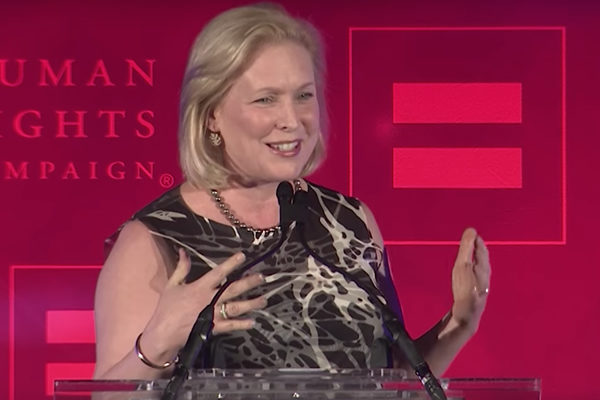News
Dems seek answers from Mattis on anti-trans military recommendations


Sen. Kirsten Gillibrand (D-N.Y.) is among the Democrats seeking answers from Defense Secretary James Mattis over his anti-trans military recommendations. (Image courtesy of YouTube)
In a joint letter to Mattis dated April 11, the quartet of Democrats say they were “surprised and disappointed” by Mattis’ conclusions against transgender service, which the White House made public late last month in an announcement renewing Trump’s ban.
“In our view, these recommendations contradict previous findings from the Department of Defense and the professional medical community,” the letter says. “As the president has empowered you to implement appropriate policies governing service by transgender individuals, we feel it imperative that we explore the factual bases behind your recommendations.”
The letter is signed by Rep. Adam Smith (D-Wash.), top Democrat on the House Armed Services Committee; Sen. Jack Reed (D-R.I.), top Democrat on the Senate Armed Services Committee; Rep. Jackie Speier (D-Calif.), and Sen. Kirsten Gillibrand (D-N.Y.). Both Speier and Gillibrand introduced bills in their respective chambers of Congress against Trump’s transgender military ban, but those measures also sought to codify Mattis’ review before it was completed.
“There are currently thousands of transgender individuals openly serving in the military with bravery and distinction,” the letter says. “There has been no indication that this has had an impact on overall readiness. All individuals who are willing and qualified should be able to volunteer to serve, regardless of their gender identity.”
The letter comes on the heels of objections to Mattis’ recommendations and Trump’s transgender ban from the American Medical Associations, which asserted the Pentagon “mischaracterized and rejected” medical research in its conclusions, as well as the American Psychological Association and two former U.S. surgeons general.
The conclusions Mattis reached are different from those during the Obama era under then-Defense Secretary Ashton Carter, who declared transgender people should be able to serve in the U.S. military after his own year-long review. Trump would later reverse this action.
Observing Mattis made his recommendations after he convened a “panel of experts” on transgender military service, the lawmakers pose six questions to the Pentagon about this review process.
1. Who was on the Panel of Experts?
2. Who did the Panel consult with?
3. Did the Panel consult with the American Psychiatric Association, American Psychological Association or American Medical Association or any other medical professionals with expertise in gender dysphoria?
4. In your view, what are the substantial risks associated with the accessions and retention of transgender persons? Can you please provide any examples that since June 30, 2016 these issues have arisen within the military and describe how the DOD or services handled these situations?
5. In your view, what are the specific issues that could undermine readiness, disrupt unit cohesion, and impose an unreasonable burden on the military? Can you please provide any examples that since June 30, 2016 these issues have arisen within the military and describe how the DOD or services handled these situations?
6. Were any government officials outside of DOD or the Department of Homeland Security (DHS) involved in the Report or your Memorandum to the president? If so, who were these officials and what was the basis for their involvement?
Additionally, the letter requests “the specific medical and scientific data that supported the conclusions contained in your memorandum.”
The administration has made conflicting statements on whether or not officials outside the Pentagon influenced the panel of experts. The White House told the Washington Blade the Pentagon made the conclusions “without regard to any external factors,” but Pentagon spokesperson Dana White said “it was a coordinated effort with the White House as well as the Department of Justice.”
Sources have told the Blade the military joint chiefs weren’t briefed before the Trump went public with the reaffirmation of his ban last month. A Pentagon spokesperson nonetheless said their representatives had input on the process leading to the Mattis recommendation.
Despite Mattis’ recommendations and Trump’s reaffirming of his transgender ban, the courts have banned the administration from enforcing it as a result of litigation from LGBT legal groups filed after Trump first announced via Twitter in July he’d ban transgender people from the military “in any capacity.”
A Pentagon spokesperson confirmed to the Washington Blade receipt of the letter from congressional Democrats, but had no immediate comment.
The White House
A full year of Trump and LGBTQ rights: all that’s been lost
White House since Inauguration Day has relentlessly attacked LGBTQ community

Uncloseted Media published this story on Jan. 20.
By NICO DiALESSANDRO | One year ago today, Donald Trump was inaugurated as president of the United States for the second time. Since then, he and his administration have waged an all-out attack on the LGBTQ community by slashing crucial health and support programs, pressuring states to exclude transgender people from most aspects of life and erasing information about the community’s history. Here are all the biggest moves Trump has made against LGBTQ rights over the last 365 days.
Jan. 20, 2025 – Trump’s second first day
During his inaugural address, Trump says, “As of today, it will henceforth be the official policy of the United States government that there are only two genders: male and female.” Later that day, Trump signs “Defending Women from Gender Ideology Extremism and Restoring Biological Truth to the Federal Government,” an executive order that defines “sex” in federal law to mean biological sex at conception. It also eliminates federal recognition of trans identities, blocks gender self-identification on federal documents, ceases federal funding for gender-affirming care and restricts trans people’s access to bathrooms, prisons, shelters and other government facilities that match their gender identity.
Trump also signs “Ending Radical and Wasteful Government DEI Programs and Preferencing,” an executive order that orders federal agencies to terminate Diversity, Equity and Inclusion mandates, policies and programs. This order repeals a policy put in place by the Biden administration that created initiatives for the federal government to combat systemic barriers related to hiring on the basis of race, religion, income, gender identity, sexual orientation, and disability.
“We’re the party of common sense, you know, we don’t want to have men playing in women’s sports. We don’t want to have transgender operations for everyone,” Trump says at the Liberty Ball party that evening. Trump would go on to repeat the sentiment countless times throughout the year, including at press conferences with world leaders, in an interview with 60 Minutes and even while deploying the National Guard in Washington.
Jan. 21, 2025 – The flurry of executive orders continues
Trump signs “Ending Illegal Discrimination and Restoring Merit-Based Opportunity,” another executive order that revokes a 1965 order which mandated affirmative action for federal contractors and required that they take steps to comply with nondiscrimination laws. The order violates the U.S. Supreme Court’s 2020 decision in Bostock v. Clayton County, which extended Title VII sex-based protections to trans people.
Nearly all LGBTQ- and HIV-focused content and resources are deleted from the White House’s website including the White House’s equity report, information about LGBTQ Pride Month and a fact sheet on expanding access to HIV prevention and treatment. In addition, the State Department removes its LGBTQ rights page, and the Department of Labor removes its LGBTQ workers page.
Jan. 28, 2025 – funding cuts
Trump signs “Protecting Children from Chemical and Surgical Mutilation,” an executive order that bars federal funding for gender-affirming care for minors and directs the Department of Health and Human Services to restrict insurance coverage for such treatments under Medicare, Medicaid and the Affordable Care Act. Hours after Trump signs the order, Uncloseted Media speaks with six LGBTQ kids to get their thoughts.
“For me, it’s definitely very frightening. Especially because right now I’m 16, and so, I’m going to become an adult over the course of his presidency. … And it’s really difficult, especially to plan for the future and have that lack of surety that I thought that I would,” Crow, who lives in Virginia, told Uncloseted Media.
Feb. 3, 2025
Mentions of LGBTQ people are erased or minimized across federal government websites, with a particular focus on trans and intersex people. The State Department first removes trans people in its travel safety guidelines, only mentioning the “LGB” community. As of publication, the web page has no mention of bisexual travelers either.
Feb. 5, 2025
Trump signs “Keeping Men Out of Women’s Sports,” an executive order that prohibits trans women and girls from competing on collegiate female sports teams.
Feb. 13, 2025
Under the direction of Trump’s executive order, the National Park Service removes references to trans and queer rights and history, including from the Stonewall National Monument pages. The “TQ” from “LGBTQ” is dropped in instances where the acronym is present. Protesters gather at the Stonewall National Monument in New York the next day to voice their outrage.
In an interview with Uncloseted Media, Stacy Lentz, co-owner of the Stonewall Inn, calls the removal a blatant attempt to rewrite history and exclude the very people who led the fight for equality.

Feb. 14, 2025
The U.S. withdraws from the United Nations LGBTI Core Group, which formed in 2008 and pledges to support LGBTQ and intersex rights by “work[ing] within the United Nations framework on ensuring universal respect for the human rights and fundamental freedoms for all, specifically lesbian, gay bisexual, transgender and intersex (LGBTI) persons, with a particular focus on protection from violence and discrimination.”
March 15, 2025 – illegal deportations
The Trump-Vance administration deports 238 Venezuelan migrants to CECOT, a maximum-security prison in El Salvador. The administration claims these individuals are affiliated with the Tren de Aragua gang. Andry Hernández Romero, a gay makeup artist seeking asylum, is one of the migrants with no criminal record. Hernández vanished from U.S. custody before his asylum hearing, and his lawyer asserts he was deported without due process.

On July 18, Hernández is returned to Venezuela along with 249 other migrants. The Department of Homeland Security dismisses abuse allegations of torture, sexual assault and other inhumane treatment.
April 2, 2025
U.S. Citizenship and Immigration Services updates its policy to recognize only two biological sexes, male and female, for immigration benefit requests and official documentation. This policy shift reverses previous efforts to accommodate nonbinary and trans individuals, as it removes the “X” gender marker option from immigration forms.
“By denying trans people the right to self-select their gender, the government is making it harder for them to exist safely and with dignity. This is not about ‘common sense’ — it is about erasing an entire community from the legal landscape,” says Bridget Crawford, director of law and policy at Immigration Equality.
April 3, 2025
In his first few months in office, Trump and his administration cancel over 270 National Institutes of Health grants focused on LGBTQ health, totaling at least $125 million in unspent funds. The cancellations disrupt research on HIV testing and prevention, AIDS, cancer, mental health and more.
The cuts scrap more than $800 million worth of research into the health of LGBTQ people. The cuts abandon studies of cancers and viruses and set back efforts to defeat a resurgence of sexually transmitted infections. They also eliminate swaths of medical research on diseases that disproportionately afflict LGBTQ people, including HIV/AIDs, various sexually transmitted infections and cancers.
June 2, 2025
Stanford begins suspending gender-affirming care for people younger than 19 in response to Trump’s executive order. Other major health networks and many regional centers across the country begin following suit.
Children’s Hospital Los Angeles announces they will be cutting off care for patients as old as 25 beginning in July, stating that they were left with “no viable alternative” because they could not risk any cuts to their federal funding.
June 6, 2025
Trump’s military ban begins, disallowing trans people from serving in all branches of the armed forces and removing those currently in the service. Those who do not identify themselves will have their medical records surveyed and be involuntarily separated if it is discovered that they are trans.
July 1, 2025
Trump’s “Big Beautiful Bill” is passed by Congress. The sweeping package of tax breaks that largely benefit the wealthy include major funding cuts to LGBTQ health care as well as a number of support programs that disproportionately serve queer people.
July 17, 2025
The Trump-Vance administration officially shuts down the LGBTQ-specific option on the 988 youth suicide hotline. This comes a year after data finds that 41 percent of LGBTQ youth seriously considered suicide. Notably, there are no plans to shut down the other targeted hotline options. Arden, who called when they were 16, told Uncloseted Media, “If it weren’t for the hotline, I would have killed myself.”
Aug. 4, 2025
U.S. Immigration and Customs Enforcement arrests 40-year-old asylum seeker Rickardo Anthony Kelly during a routine immigration appointment. Kelly, who survived being shot 10 times in Jamaica by attackers who targeted him for being gay, is released two weeks later and describes the conditions of the ICE facility as “unconscionable,” “inhumane,” and “horrific.”
Aug. 12, 2025
The State Department releases a revised 2024 human rights report that omits references to LGBTQ people and erases mentions of discrimination based on sexual orientation or gender identity. The report also removes critiques of governments for mistreating LGBTQ communities.
It excludes information about Hungary’s anti-LGBTQ laws that encourage citizens to report their LGBTQ neighbors and that ban depictions of homosexuality or gender transition in schools or the media.
Aug. 15, 2025
The Trump-Vance administration announces plans to eliminate gender-affirming care from the Federal Employees Health Benefits Program starting in 2026. The policy would also block access to hormones and surgeries for federal workers and their families.
Aug. 20, 2025
The media reports on court filings that reveal that the Justice Department issued subpoenas to hospitals for private medical records of LGBTQ patients 18 and younger. The DOJ requests billing data, communication with drug manufacturers, Social Security numbers and recordings from providers who treat gender nonconforming minors. Doctors across the country report threats and fear government retaliation.
“The subpoena is a breathtakingly invasive government overreach. … It’s specifically and strategically designed to intimidate health care providers and health care institutions into abandoning their patients,” says Jennifer L. Levi, senior director of transgender and queer rights at GLAD law, an LGBTQ legal group and civil rights organization.
Sept. 4, 2025
In response to a mass shooting in Minneapolis that was carried out by a trans woman, CNN reports that the DOJ is considering restricting trans Americans’ Second Amendment rights. The department aims to justify a firearm ban by declaring trans people mentally “defective,” building off of Trump’s trans military ban. The proposal sparks backlash from the National Rifle Association, who says in a statement that they will not “support … gun bans that arbitrarily strip law-abiding citizens of their Second Amendment rights.”
Sept. 12, 2025
The DOJ removes a study from its website showing that far-right extremists have killed more Americans than any other domestic terrorist group. The archived report disappears two days after anti-LGBTQ conservative activist Charlie Kirk is assassinated.

Sept. 22, 2025
White House Press Secretary Karoline Leavitt claims the administration is investigating why trans people are turning to “domestic terrorism,” despite no evidence of this. She calls anyone denying the false link “willfully ignorant,” despite the most recent data available from 2018 showing that trans people are four times more likely to be victims of violent crime when compared to cisgender people.
Sept. 23, 2025
Trump cancels a budget meeting and blames a potential government shutdown on Democrats’ support for trans-inclusive policies.
Oct. 1, 2025
FBI Director Kash Patel fires a trainee for displaying a Pride flag on his desk, labeling it an improper “political” message. The dismissal follows reports that pro-Trump appointees are combing internal FBI files to identify LGBTQ employees.
Oct. 3, 2025
Education Secretary Linda McMahon sends a nine-page proposal to nine universities that asks for a commitment to ban trans-inclusive facilities, define sex by “reproductive function” and limit race, gender or identity factors in admissions. The proposal calls for schools to revise their governance structures by “abolishing institutional units that purposefully punish, belittle, and even spark violence against conservative ideas.”
Oct. 10, 2025
The White House lays off more than 1,100 HHS employees. The Office of Population Affairs, which administered Title X family-planning networks, teen pregnancy prevention and LGBTQ health initiatives, is eliminated.
Nov. 6, 2025
The Supreme Court grants the Trump-Vance administration’s request to put a hold on federal rulings in Massachusetts, affecting trans and nonbinary people by preventing them from self-identifying correctly on their IDs, claiming to be in line with Trump’s “Defending Women from Gender Ideology Extremism and Restoring Biological Truth to the Federal Government” executive order. In her dissent, Justice Ketanji Brown Jackson writes, “This court has once again paved the way for the immediate infliction of injury without adequate (or, really, any) justification. Because I cannot acquiesce to this pointless but painful perversion of our equitable discretion, I respectfully dissent.”
Dec. 4, 2025
According to a memo obtained by NPR, the DOJ instructs inspectors to stop evaluating prisons and jails using standards designed to protect trans, intersex, and gender nonconforming people from sexual violence. This is in direct violation of the Prison Rape Elimination Act.
Dec. 18, 2025
HHS Secretary Robert F. Kennedy Jr. and Mehmet Oz, who leads Medicaid and Medicare, announce that HHS is heavily restricting trans health care; prohibiting Medicaid reimbursement for gender-affirming care for people under 18; and blocking all Medicare and Medicaid funding for hospitals that provide the care to minors.
Jan. 1, 2026
The Office of Personnel Management institutes policy changes that exclude coverage for “chemical and surgical” gender-affirming care in the FEHB and Postal Service Health Benefits plans for 2026, with narrow exceptions.
Jan. 7, 2026
Renee Good is shot and killed by ICE agent Jonathan Ross in Minneapolis. Good leaves behind a wife, Becca, and three children. In a statement, Becca remembers her wife:
“Renee lived by an overarching belief: there is kindness in the world and we need to do everything we can to find it where it resides and nurture it where it needs to grow. Renee was a Christian who knew that all religions teach the same essential truth: we are here to love each other, care for each other, and keep each other safe and whole.”

Days later, Trump tells reporters, “At a very minimum, that woman was very, very disrespectful to law enforcement. … It was highly disrespectful of law enforcement. The woman and her friend were highly disrespectful of law enforcement.”
Additional reporting by Hope Pisoni. Washington Blade photos by Michael Key and Michael K. Lavers.
Congress
McBride, other US lawmakers travel to Denmark
Trump’s demand for Greenland’s annexation overshadowed trip

Delaware Congresswoman Sarah McBride is among the 11 members of Congress who traveled to Denmark over the past weekend amid President Donald Trump’s continued calls for the U.S. to take control of Greenland.
McBride, the first openly transgender person elected to Congress, traveled to Copenhagen, the Danish capital, with U.S. Sens. Chris Coons (D-Del.), Thom Tillis (R-N.C.), Jeanne Shaheen (D-N.H.), Dick Durbin (D-Ill.), and Lisa Murkowski (R-Alaska) and U.S. Reps. Steny Hoyer (D-Md.), Gregory Meeks (D-N.Y.), Madeleine Dean (D-Pa.), Don Bacon (R-Neb.), and Sarah Jacobs (D-Calif.). The lawmakers met with Danish Prime Minister Mette Frederiksen and Greenlandic MP Pipaluk Lynge, among others.
“I’m grateful to Sen. Coons for his leadership in bringing together a bipartisan, bicameral delegation to reaffirm our support in Congress for our NATO ally, Denmark,” said McBride in a press release that detailed the trip. “Delaware understands that our security and prosperity depend on strong partnerships rooted in mutual respect, sovereignty, and self-determination. At a time of growing global instability, this trip could not be more poignant.”
Greenland is a self-governing territory of Denmark with a population of less than 60,000 people. Trump maintains the U.S. needs to control the mineral-rich island in the Arctic Ocean between Europe and North America because of national security.
The Associated Press notes thousands of people on Saturday in Nuuk, the Greenlandic capital, protested against Trump. British Prime Minister Keir Starmer is among those who have criticized Trump over his suggestion the U.S. would impose tariffs against countries that do not support U.S. annexation of Greenland.
A poll that Sermitsiaq, a Greenlandic newspaper, and Berlingske, a Danish newspaper, commissioned last January indicates 85 percent do not want Greenland to become part of the U.S. The pro-independence Demokraatit party won parliamentary elections that took place on March 12, 2025.
“At this critical juncture for our countries, our message was clear as members of Congress: we value the U.S.-Denmark partnership, the NATO alliance, and the right of Greenlanders to self-determination,” said McBride on Sunday in a Facebook post that contained pictures of her and her fellow lawmakers meeting with their Danish and Greenlandic counterparts.
Virginia
Two gay candidates running in ‘firehouse’ Va. House of Delegates primary in Alexandria
Kirk McPike, Gregory Darrall hope to succeed delegate vying for Ebbin’s seat

Gay Alexandria City Council member Kirk McPike and gay public school teacher Gregory Darrall, who serves as vice president of the Fairfax County Federation of Teachers, are among four candidates running in a Jan. 20 “firehouse” Democratic primary for a seat in the Virginia House of Delegates.
With less than a week’s notice, Democratic Party officials in Alexandria called the primary to select a Democratic nominee to run in a Feb. 10 special election to fill the 5th House District seat being vacated by state Del. Elizabeth Bennett-Parker (D-Alexandria).
Bennett-Parker won the Democratic nomination for the Virginia Senate seat being vacated by gay state Sen. Adam Ebbin (D-Alexandria), who is resigning from the seat to take a position in the administration of Democratic Virginia Gov. Abigail Spanberger, who took office on Jan. 17.
Bennett-Parker won the nomination for the state Senate seat in yet another firehouse primary on Jan. 13 in which she defeated three other candidates, including gay former state Del. Mark Levine.
The Jan. 20 primary in which McPike and Darrall are competing will take place from 8:30 a.m. to 7 p.m. in two polling places in Alexandria: the Charles E. Beatley Jr. Central Library at 5005 Duke St. and the Charles Houston Recreation Center at 901 Wythe St.
The other two candidates running are former Alexandria City School Board member Eileen Cassidy Rivera and criminal law defense attorney Chris Leibig.
McPike, who first won election to the Alexandria City Council in 2021, served for 13 years as chief of staff for gay U.S. Rep. Mark Takano (D-Calif.) prior to winning election to the Alexandria City Council.
“Now, Kirk is ready to bring his experience to Richmond to keep improving the lives of all Virginians as our delegate for House District 5,” his campaign website says. His website writeup says he and his husband, Cantor Jason Kaufman, have lived in Alexandria’s Seminary Hill neighborhood for 15 years.
“As delegate, we can count on Kirk to keep delivering for us — helping Virginia maintain our commitments to our schools, our first responders, and our efforts to address climate change, housing affordability, and infrastructure,” the website statement says.
McPike, a longtime LGBTQ rights supporter and advocate, has been endorsed by Ebbin and U.S. Rep. Don Beyer (D-Va.). Beyer said in a statement that McPike “has a proven track record of delivering results for Alexandrians.” The LGBTQ+ Victory Fund, which raises money for LGBTQ candidates running for public office, has also endorsed McPike.
Darrall’s campaign website says he is a “proud progressive, lifelong educator, and labor leader running to put people first.” It says he is a political newcomer “with more than 20 years in the classroom” as a teacher who played a key role in the successful unionization of Fairfax Public Schools.
“He is a proud member and staunch supporter of the LGBTQIA+ community,” his website statement says. It says he met his husband Jose while living in Miami and the two operated a small business in South Florida for a decade before moving to Alexandria in 2015. It adds that Darrall is “fluent in Spanish, loves walking Alexandria’s neighborhoods, and is driven by a deep belief in fairness, equality, and strengthening our democracy from the ground up.”
The Alexandria Republican City Committee nominated local business executive Mason Butler as the Republican nominee for the House of Delegates seat in the Feb. 10 special election after he emerged as the only GOP candidate running for the seat, according to the Alexandria Brief publication. He will face the Democratic winner in the Jan. 20 firehouse primary.
The Washington Blade is seeking to determine GOP candidate Butler’s and Democratic candidates Leibig’s and Rivera’s positions on LGBTQ-related issues and will update this story if their positions on those issues can be determined.

















